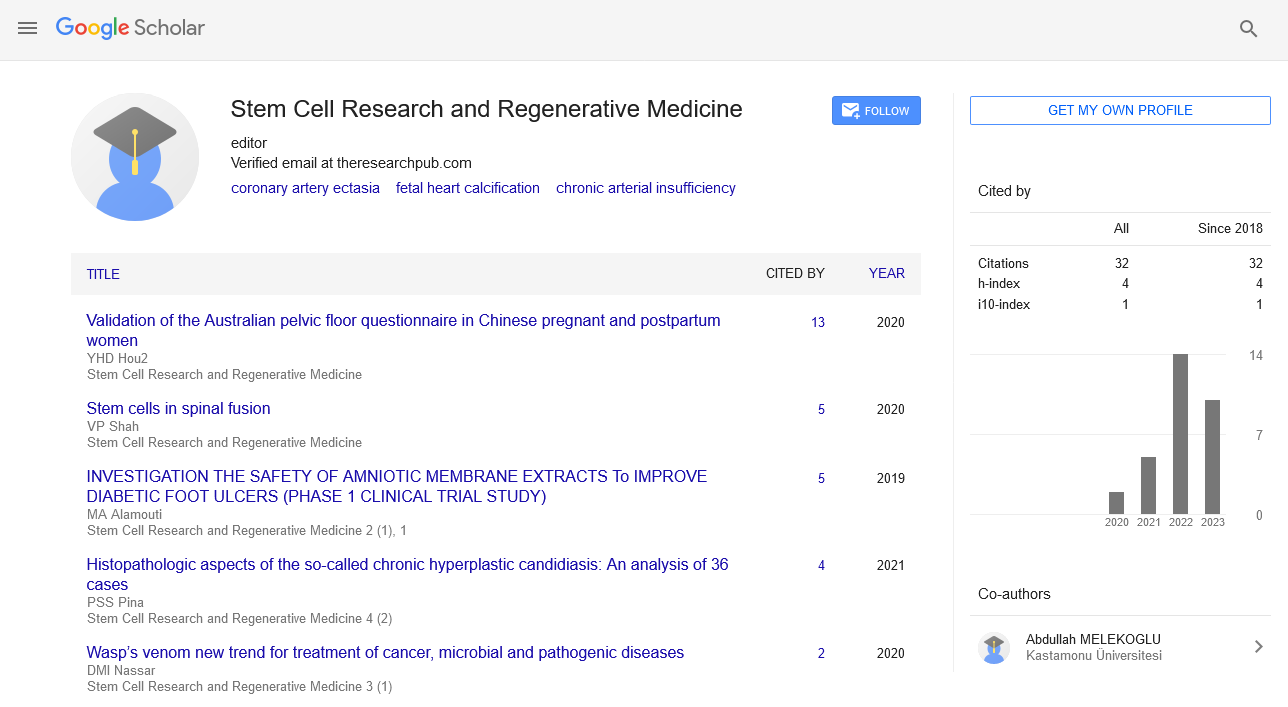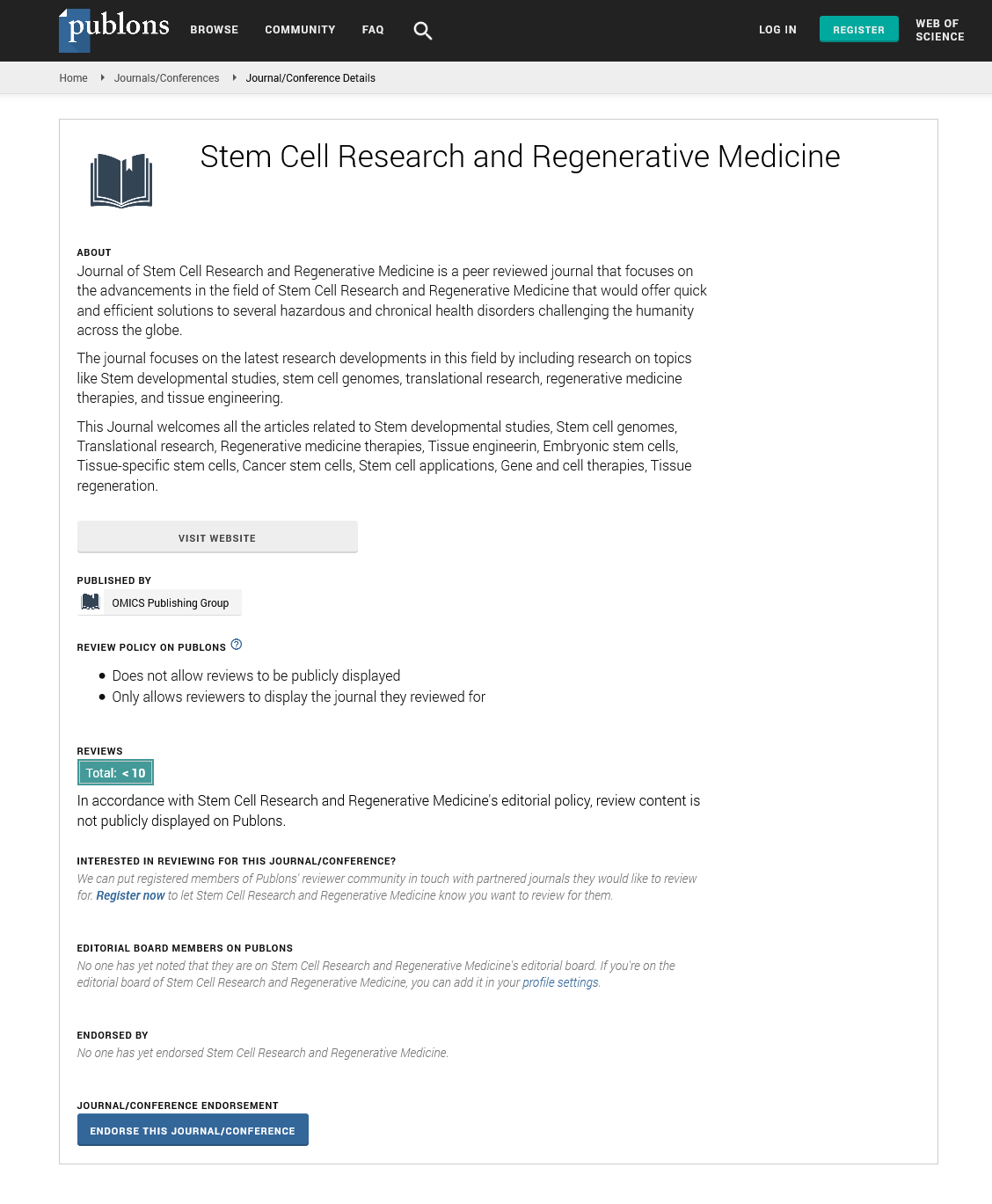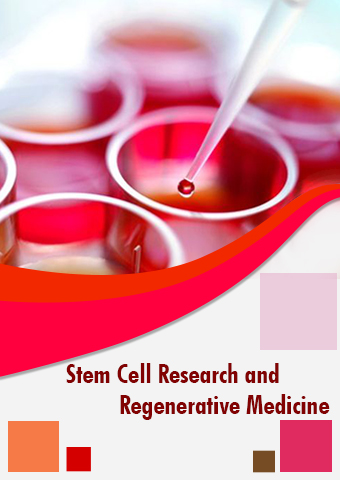Short Communication - Stem Cell Research and Regenerative Medicine (2020)
Targeting QKI-7 in vivo restores endothelial cell function in diabetes
Andriana Margariti
Queen’s University Belfast, UK
Abstract
Diabetes has become a major health problem worldwide. Vascular Endothelial Cell (EC) dysfunction plays a key role in the occurrence of diabetic complications. The current study discovered significant upregulation of Quaking 7 (QKI-7), in induced pluripotent stem (iPS) cellderived ECs (iPS-ECs) when exposed to hyperglycemia, and in human iPS-ECs from diabetic patients. QKI-7 was also found to be highly expressed in human coronary arterial ECs isolated from diabetic donors, while immunohistochemical staining on blood vessels obtained from diabetic critical limb ischemia patients undergoing a lower limb amputation, QKI-7 expression was detected. QKI-7 expression was found to be tightly controlled by RNA splicing factors CUGBP and hnRNPM under diabetic conditions. QKI-7 upregulation was correlated with disrupted cell barrier, compromised angiogenesis and enhanced monocyte adhesion in diabetic iPS-ECs. RNA immunoprecipitation (RIP) and mRNA decay assays revealed that QKI-7 bound and promoted mRNA degradation of downstream targets CD144, Neuroligin 1 (NLGN1) and tumor necrosis factor (TNF)-α–stimulated gene/protein 6 (TSG-6). Remarkably, when hindlimb ischemia was induced in diabetic mice and QKI-7 was knockdown in vivo in ECs, reperfusion and blood flow recovery were markedly promoted. Manipulation of QKI-7 represents a novel strategy for the treatment of diabetic vascular complications.
Publications
1. Creating an antibacterial surface on beta TNZT alloys for hip implant applications by laser nitriding
2. Donaghy, C. L., McFadden, R., Kelaini, S., Carson, L., Margariti, A. & Chan, C-W., Jan 2020, In : Optics and Laser Technology. 121, 9 p., 105793.
3. Endothelial cells derived from patients with diabetic macular edema recapitulate clinical evaluations of anti-VEGF responsiveness through the Neuronal Pentraxin 2 pathway.
4. Vila-Gonzalez, M., Kelaini, S., Naderi-Meshkin, H., Margariti, A., Stewart, S., Virgili, G., Grieve, D. J., Stitt, A. W., Lois, N. & Margariti, A., 30 Jul 2020, (Accepted) In : Diabetes.
5. NOX4 is a major regulator of cord blood-derived endothelial colony-forming cells which promotes postischaemic revascularisation
6. O’Neill, K. M., Campbell, D. C., Edgar, K. S., Gill, E. K., Moez, A., McLoughlin, K. J., O’Neill, C. L., Dellett, M., Hargey, C. J., Abudalo, R. A., O’Hare, M., Doyle, P., Toh, T., Khoo, J., Wong, J., McCrudden, C. M., Meloni, M., Brunssen, C., Morawietz, H., Yoder, M. C. & 6 others, , 01 Feb 2020, In : Cardiovascular Research. 116, 2, p. 393-405 13 p.
7. Targeting QKI-7 in vivo restores endothelial cell function in diabetes
8. Yang, C., Eleftheriadou, M., Kelaini, S., Morrison, T., González, M. V., Caines, R., Edwards, N., Yacoub, A., Edgar, K., Moez, A., Ivetic, A., Zampetaki, A., Zeng, L., Wilkinson, F. L., Lois, N., Stitt, A. W., Grieve, D. J. & Margariti, A., 30 Jul 2020, In : Nature Communications. 11, 1, 17 p., 3812.
9. A histone deacetylase 7-derived peptide promotes vascular regeneration via facilitating 14-3-3γ phosphorylation
10. Yang, J., Moraga, A., Xu, J., Zhao, Y., Luo, P., Lao, K. H., Margariti, A., Zhao, Q., Ding, W., Wang, G., Zhang, M., Zheng, L., Zhang, Z., Hu, Y., Wang, W., Shen, L., Smith, A., Shah, A. M., Wang, Q. & Zeng, L., 13 Nov 2019, In : Stem Cells.
Biography
Margariti has developed significant expertise in stem cell biology, with particular emphasis on cell reprogramming, chromatin remodelling, cell signalling and endothelial cell biology. She had received her postdoctoral training in the Cardiovascular Division of the BHF Centre of Excellence at King’s College London (KCL). Her laboratory has invested on their robust expertise on cell reprogramming and induced pluripotent stem (iPS) cell technologies and they have developed patient- specific cells lines from diabetic donors (patient specific iPS cell lines in a petri dish) based on fast and highly efficient approaches. She has been promoted to Senior Lecturer in 2017 and she is leading the iPS cells facilities in QUB, where iPS cells are generated and differentiated towards vascular cells (including ECs, Smooth Muscle Cells and Pericytes) and human blood vessel organoids, Cardiomyocyes, Neurons, Retina pigment epithelial cells and many other cell types..


